IOM Migration Research Series
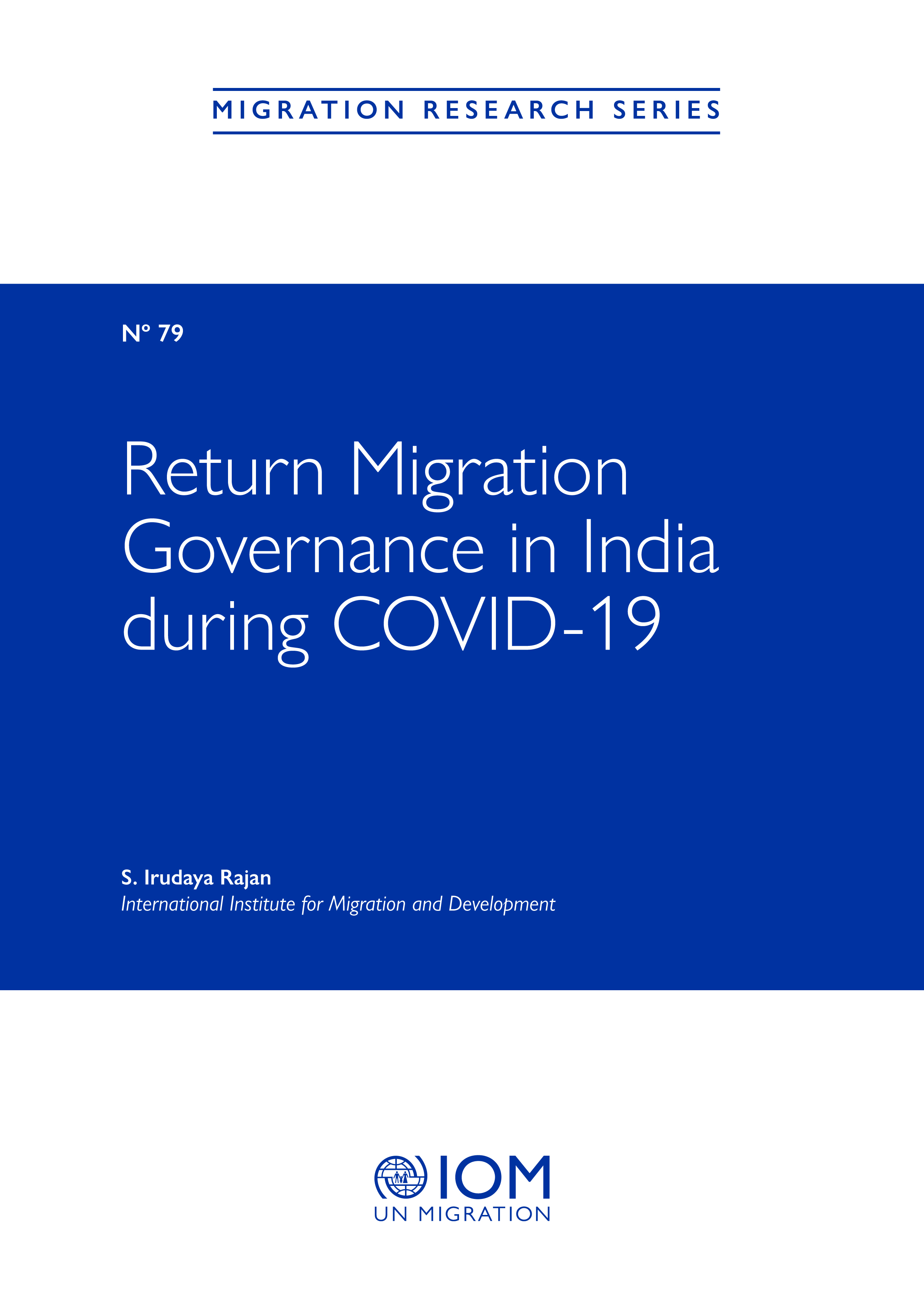
Return Migration Governance in India during COVID-19
Authored by S. Irudaya Rajan, this Migration Research Series paper explores the impact of COVID-19 on the return migration of international and internal Indian migrants. The paper provides an overview of return migration dynamics in India and the various vulnerabilities of Indian migrants that were exacerbated during the pandemic. The paper examines the programmes and policies that supported the reintegration of migrants and makes suggestions for reintegration measures that go beyond the COVID-19 pandemic to consider not only economic reintegration but also the social and psychological experiences of return migrants.
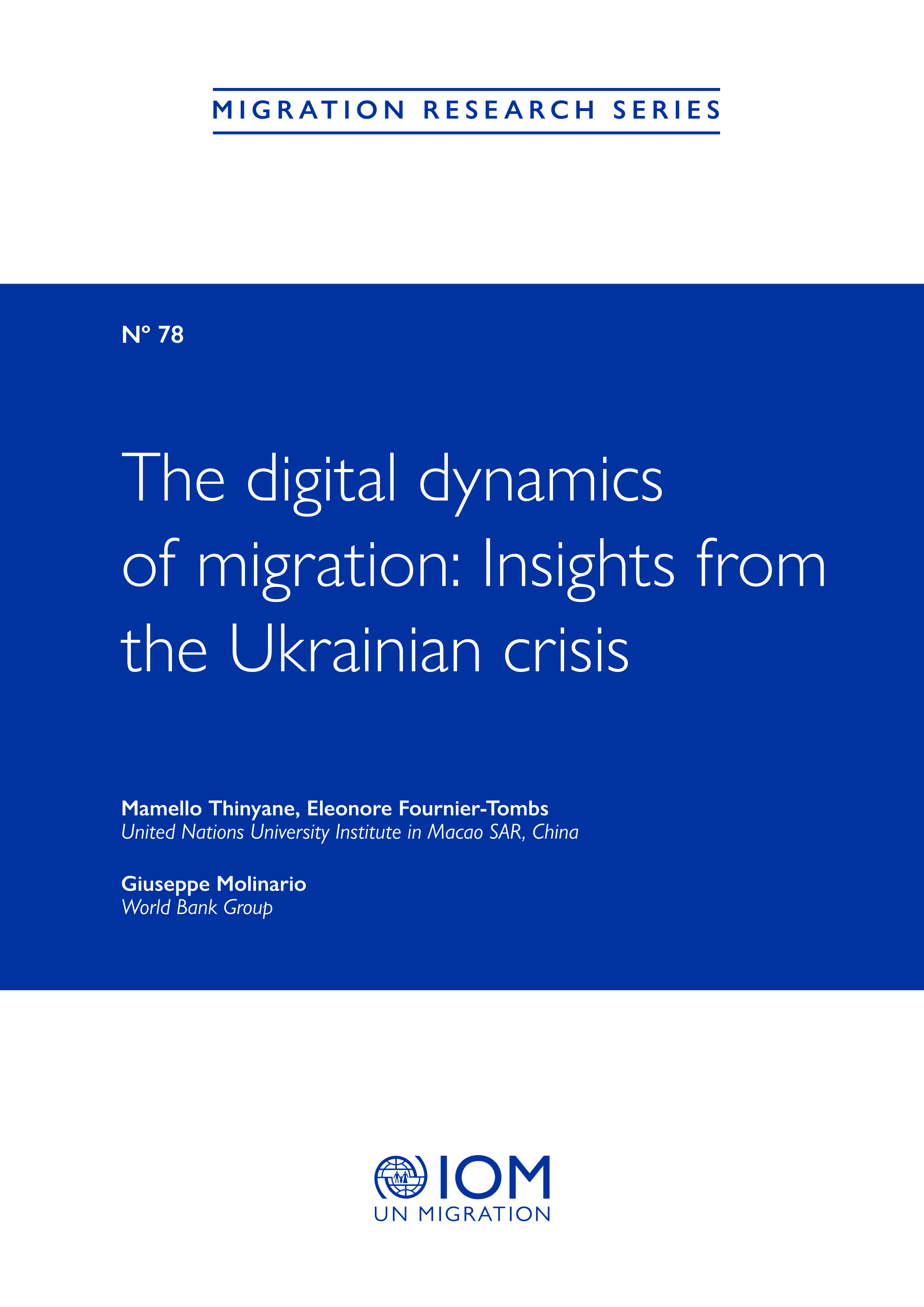
The Digital Dynamics of Migration: Insights from the Ukrainian Crisis
Authored by Mamello Thinyane, Eleonore Fournier-Tombs and Giuseppe Molinario, this Migration Research Series paper examines the digital dynamics of Ukrainian migrants and the implications of digital trends, such as online activism and remote work, on migration and displacement. The authors employ an aspirations and capabilities analytical lens to investigate the different facets of the digital lives of Ukrainian migrants. The authors argue that centring the analysis on the individual and collective capabilities and aspirations of the migrants allows for a nuanced understanding of migration and the role of digital technologies in the migration story, and ultimately offers suggestions for enhancing the digital lives of migrants.
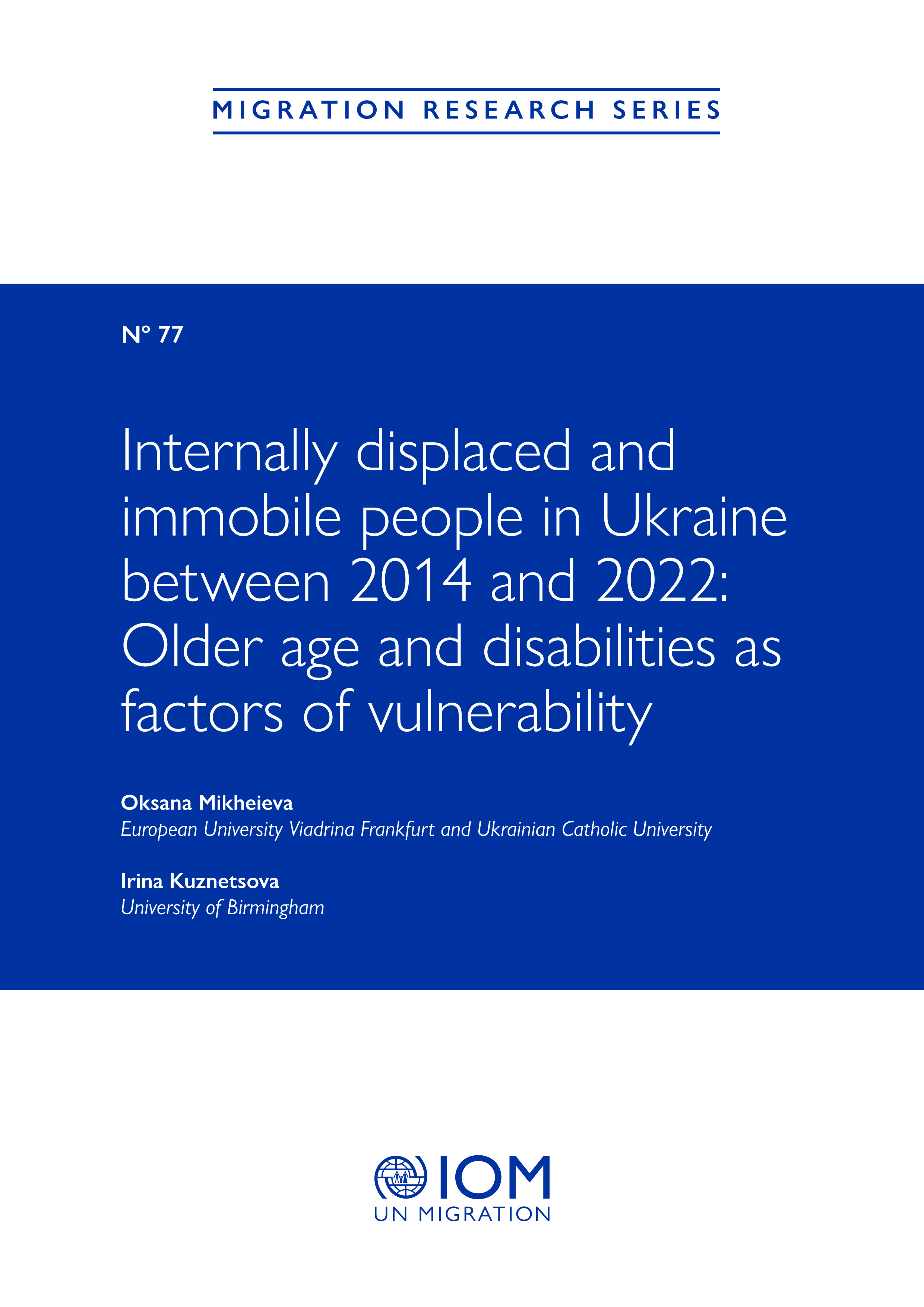
Internally Displaced and Immobile People in Ukraine Between 2014 and 2022: Older Age and Disabilities as Factors of Vulnerability
Authored by Irina Kuznetsova and Oksana Mikheieva, this Migration Research Series paper explores the impacts of the ongoing crisis in Ukraine on the individuals that were displaced before 2022. The authors argue that the pre-existing vulnerabilities of those stranded in occupied areas since February 2022 have been exacerbated, particularly at the intersections of displacement and immobility, and disability, older ag, and housing.
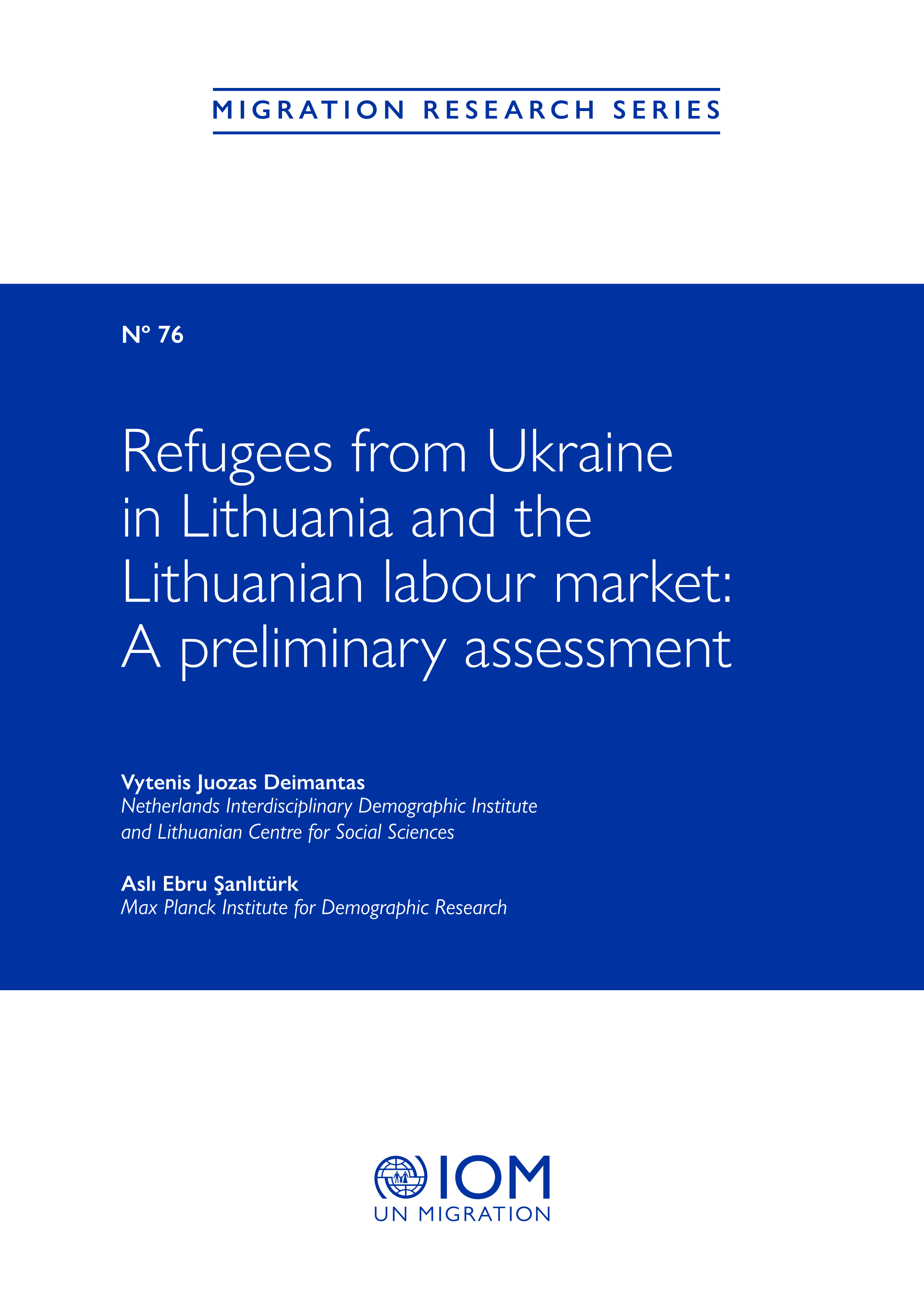
Refugees From Ukraine in Lithuania and the Lithuanian Labour Market: A Preliminary Assessment
Authored by Vytenis Juozas Deimantas and Aslı Ebru Şanlıtürk, this Migration Research Series paper focuses on the arrival of refugees from Ukraine on the labour market in Lithuania. The paper examines the distribution of refugees from Ukraine across countries of Lithuania, analyses the unemployment rates in Lithuania by gender, and explores how online job advertisements in Lithuania may or may not be accommodating to refugees from Ukraine. The authors reflect on policymaking efforts that would accommodate both local and refugee populations in the labour market.
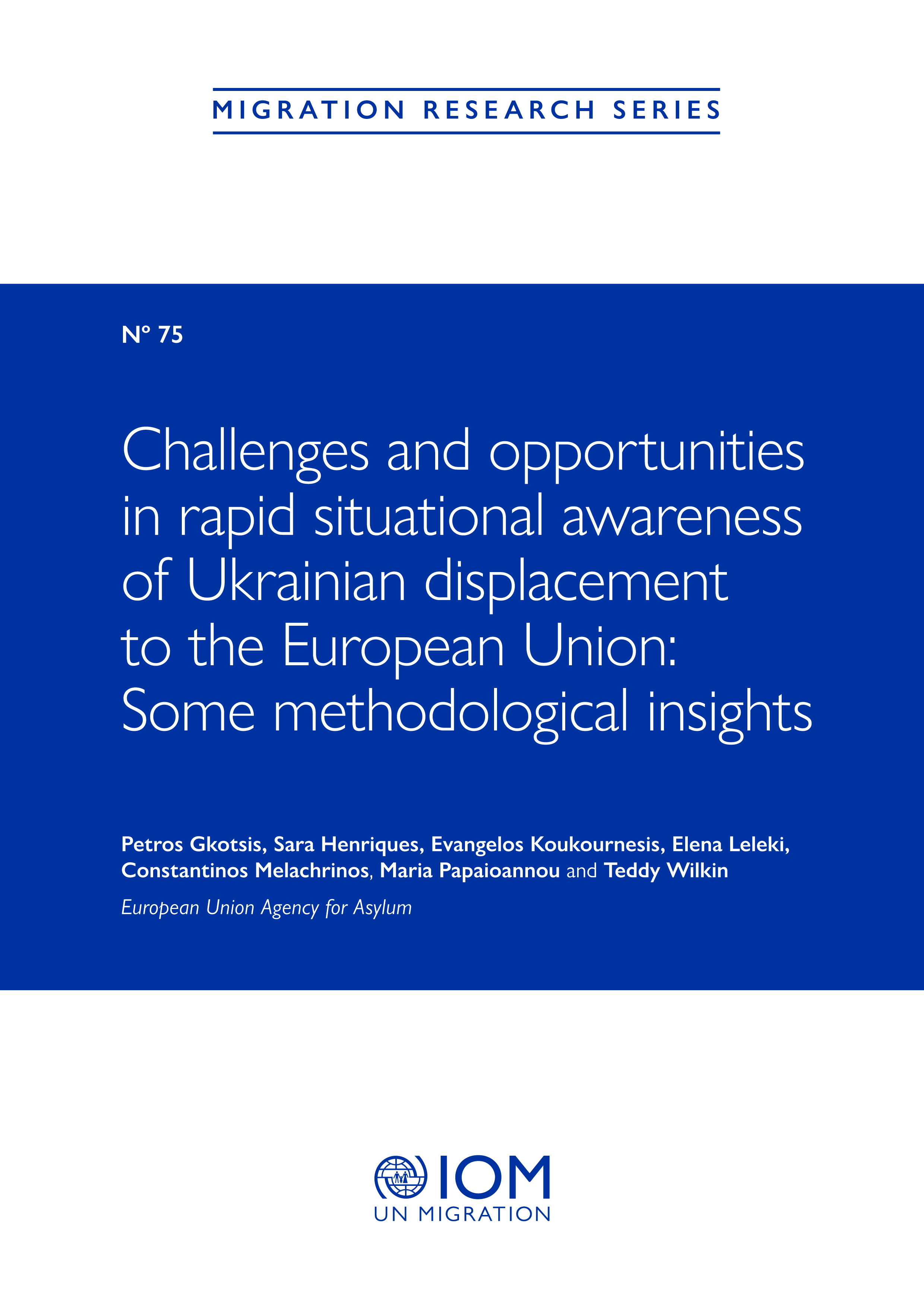
Challenges and Opportunities in Rapid Situational Awareness of Ukrainian Displacement to the European Union: Some Methodological Insights
Authored by Petros Gkotsis, Sara Henriques, Evangelos Koukournesis, Elena Leleki, Constantinos Melachrinos, Maria Papaioannou, and Teddy Wilkin, this Migration Research Series paper highlights four research projects employed by The European Union Agency for Asylum (EUAA) that seek to understand displacement from Ukraine to the European Union. The projects range from emergency measures adopted by Member States, new indicators on registrations for temporary protection, approaches to forecasting, and an online survey of displaced Ukrainians detailing demographics, their country of origin, destination, and their future aspirations. The paper concludes with reflections on lessons learned noting future considerations for research timelines, interdisciplinary research teams, and the involvement of Member State experts.
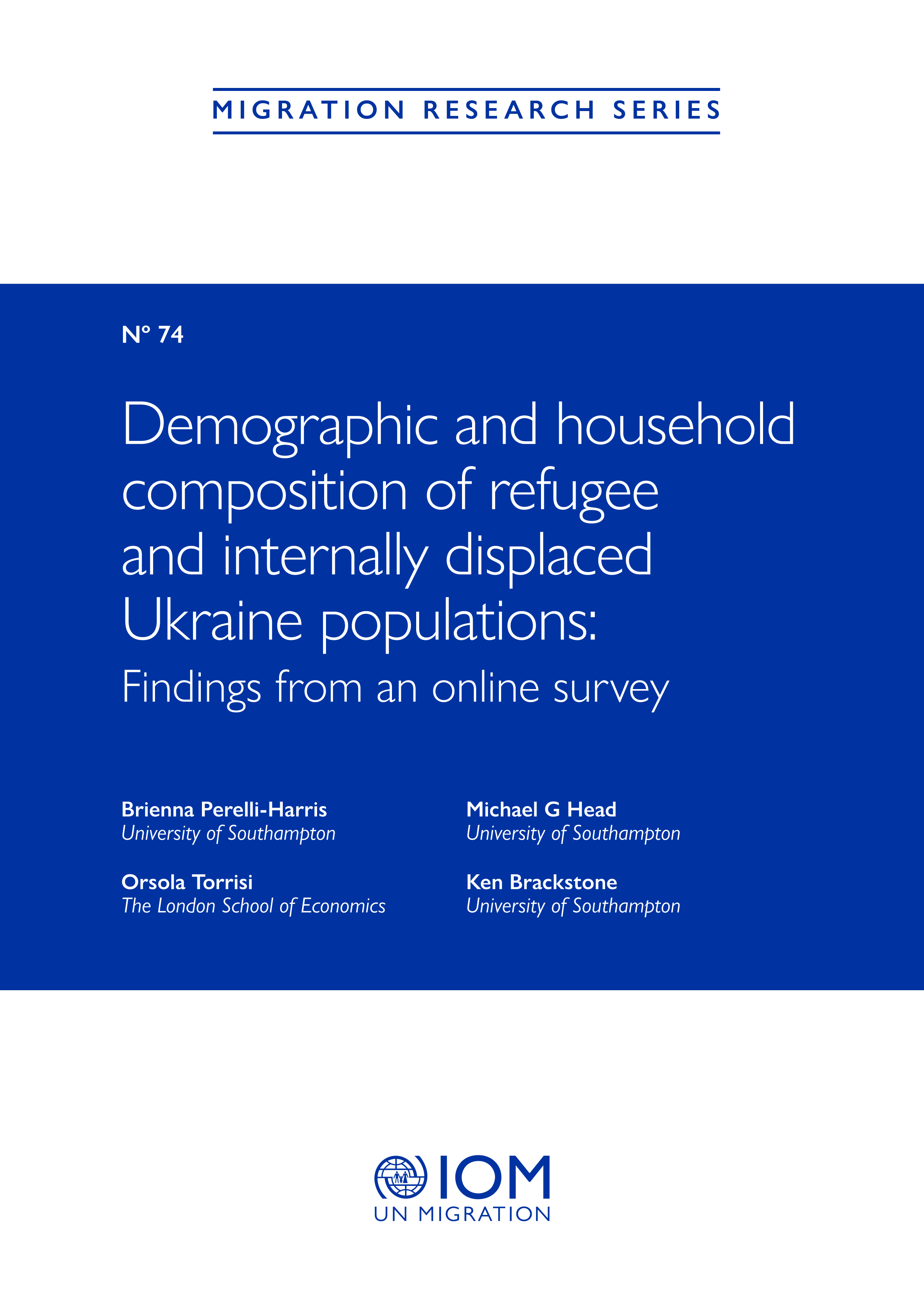
Demographic and Household Composition of Refugee and Internally Displaced Ukraine Populations: Findings From an Online Survey
Authored by Brienna Perelli-Harris, Orsola Torrisi, Michael G Head and Ken Brackstone, this Migration Research Series paper highlights the household composition and characteristics of those displaced by the Russian Federation's invasion of Ukraine. The paper showcases the findings of a rapid online health needs survey disseminated via Facebook between April and July 2022. The survey discusses the findings from 10,180 respondents, making suggestions for policies that can mitigate some of the effects of the displacement crisis.
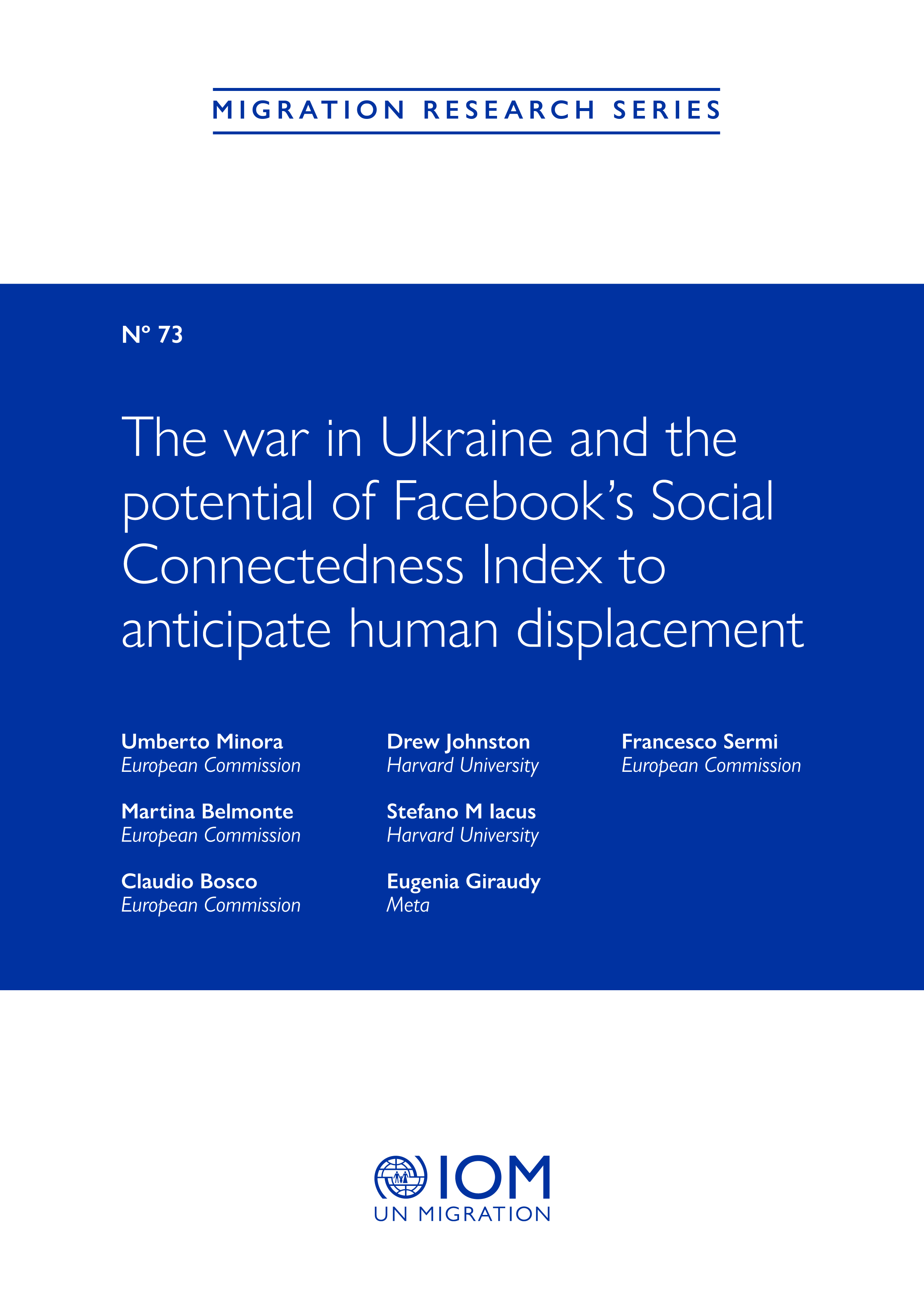
The War in Ukraine and the Potential of Facebook’s Social Connectedness Index to Anticipate Human Displacement
Authored by Umberto Minora, Martina Belmonte, Claudio Bosco, Drew Johnston, Eugenia Giraudy, Stefano M. Iacus and Francesco Sermi, this Migration Research Series paper highlights the importance of anticipating conflict-induced migration flows through innovative data from social media to support national and local authorities in terms of reception and integration. The paper explores the potential of Facebook’s Social Connectedness Index for predicting migration flows in the context of the war in Ukraine, building on previous research findings that the presence of a diaspora network is one of the major migration drivers. Results suggest that the index, along with other readily available covariates, is a strong predictor of the Ukrainian diaspora at regional scale.
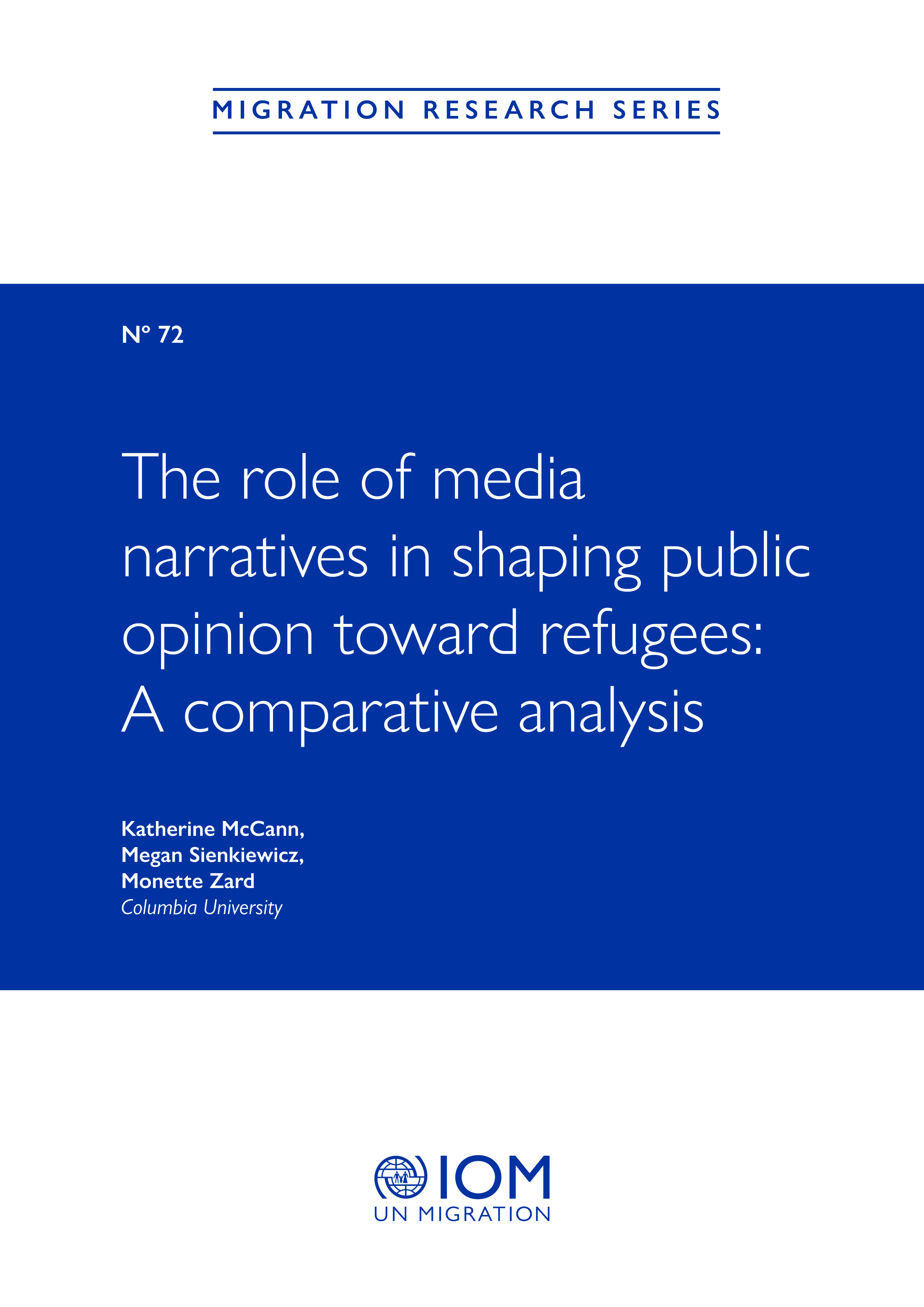
The Role of Media Narratives in Shaping Public Opinion Toward Refugees: A Comparative Analysis
Authored by Katherine McCann, Megan Sienkiewicz and Monette Zard, this Migration Research Series paper analyses the dynamics of press coverage of large-scale conflict-affected migration in Europe through two case studies: the current Ukrainian displacement and the 2015 refugee “crisis”, related in large part to the inflow of Syrian refugees. Considering that media narratives around migration play a key role in shaping political will and policy regarding asylum, the paper applies a combination of sentiment analysis and qualitative thematic analysis to explore how media discourses have shaped the narrative around these two influxes and probe the perception that race has played an outsized influence.
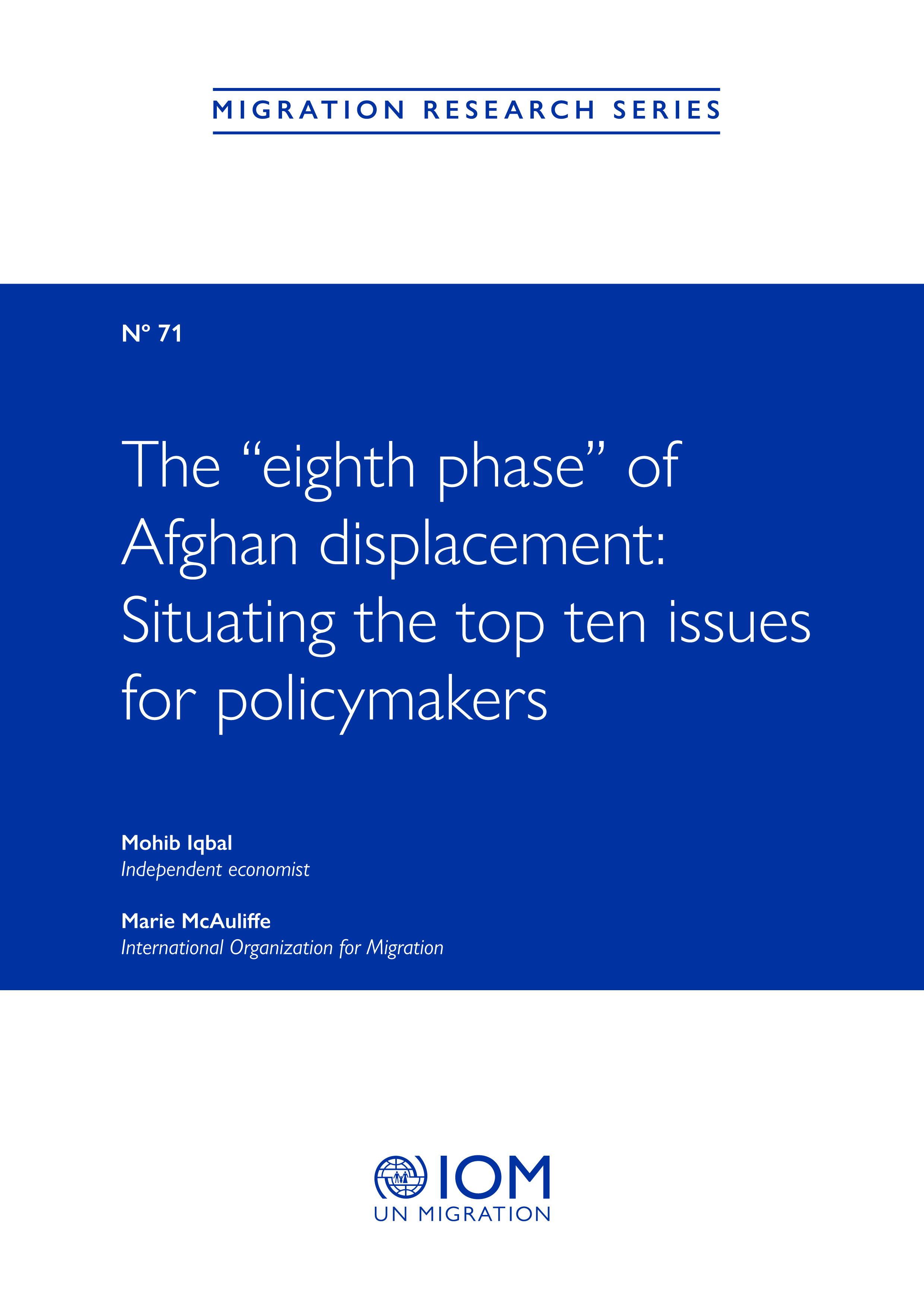
The “Eighth Phase” of Afghan Displacement: Situating the Top Ten Issues for Policymakers
The grim situation facing Afghans living in Afghanistan, the Islamic Republic of Iran and Pakistan as well as further afield is a direct result of recent (geo)political events, including the withdrawal of coalition forces in August 2021, the swift fall of the Afghan Government and the equally swift Taliban takeover. However, the longer-term human (in)security, development, economic and demographic contexts underpin decades of displacement and migration of Afghans within the immediate region of West Asia as well as further afield to countries such as Germany, the United States of America, Australia, Sweden, the Netherlands and Canada. Authored by Mohib Iqbal and Marie McAuliffe, it is within the context of multiple ‘waves’ of Afghan displacement and migration that the authors outline the ten most critical issues facing policymakers in seeking solutions to the current or new “eighth phase” of Afghan displacement.
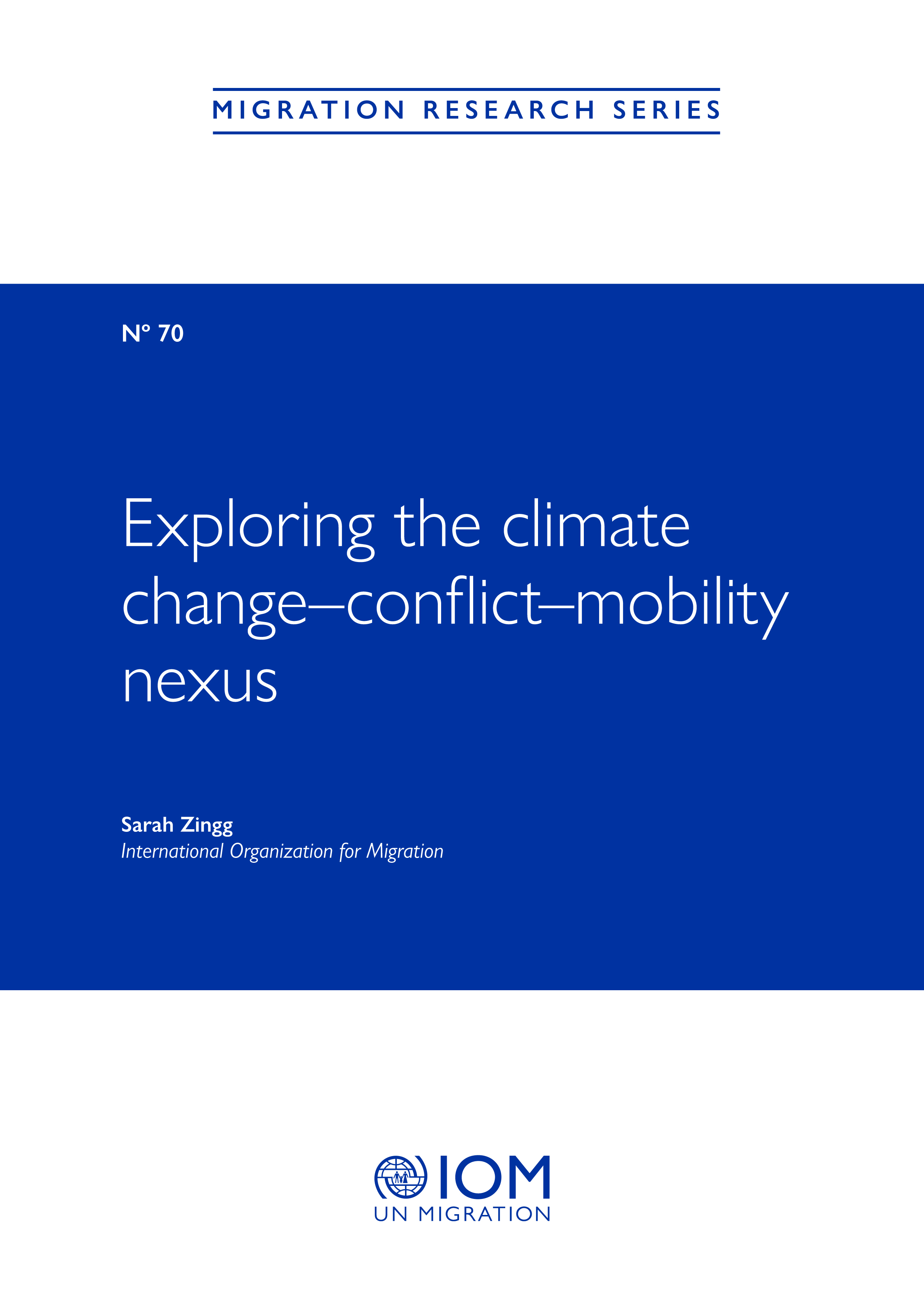
Exploring the Climate Change–conflict–mobility Nexus
Authored by Sarah Zingg, this Migration Research Series paper aims to improve the understanding of the interlinkages between climate change and conflict by providing a synthesis analysis of research on the topic. It more particularly explores four main factors identified as mechanisms through which climate change affects violent conflict, including increased migration and changing pastoral mobility patterns. The paper then provides some conclusions drawing from the findings of existing research, as well as policy and programmatic implications for peacebuilding, community stabilization and disaster risk reduction interventions.
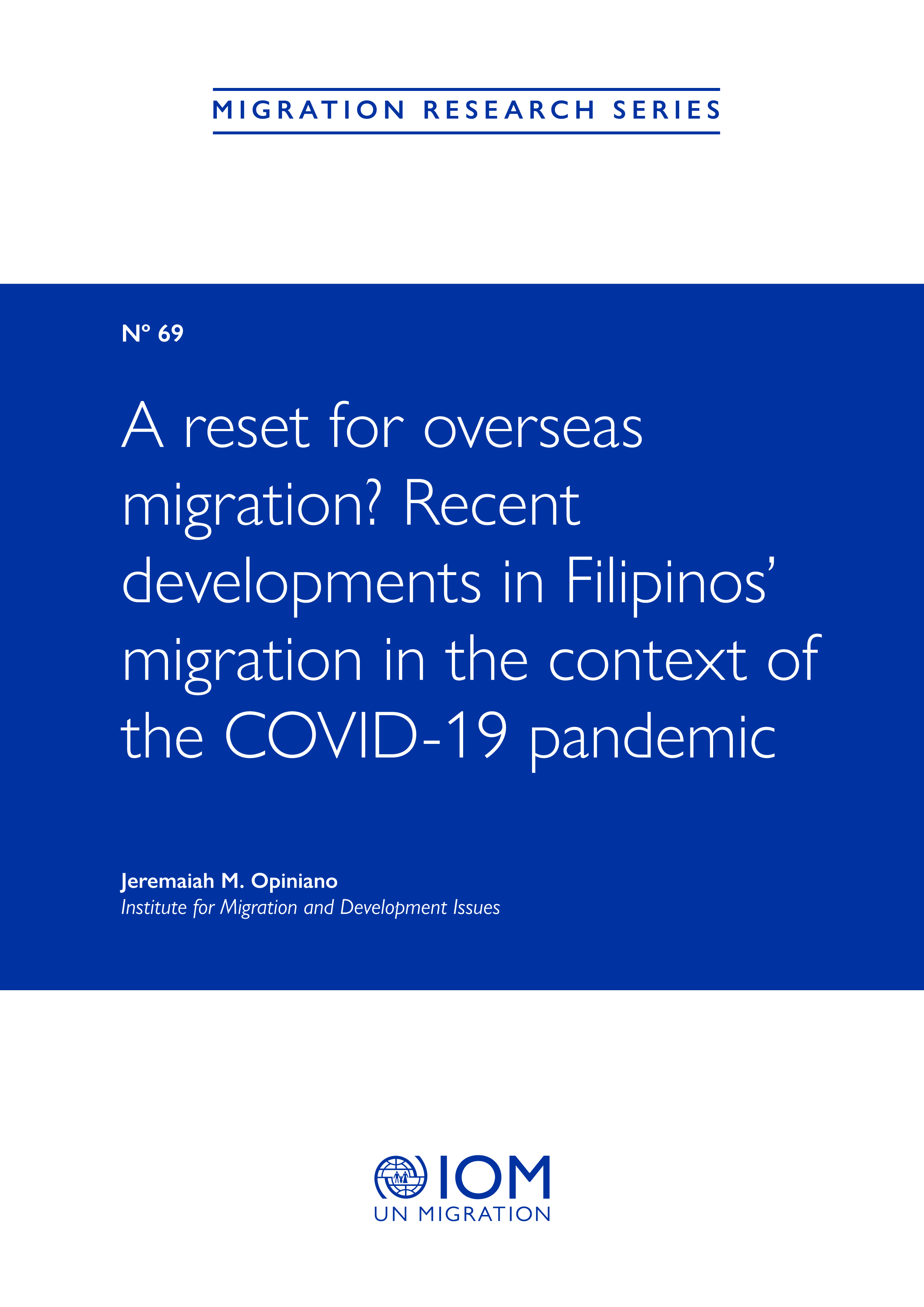
A Reset for Overseas Migration? Recent Developments in Filipinos’ Migration in the Context of the COVID-19 Pandemic
Authored by Jeremaiah M. Opiniano, this Migration Research Series paper explores some of the impacts of the COVID-19 pandemic on Filipino overseas migrants and the responses and measures adopted by the Philippines in 2020. It reviews the main implications and challenges that were raised by the pandemic between 25 March 2020 and 24 March 2021, from issues concerning repatriations and returns, to decreasing overseas employment and the impact on international remittances.
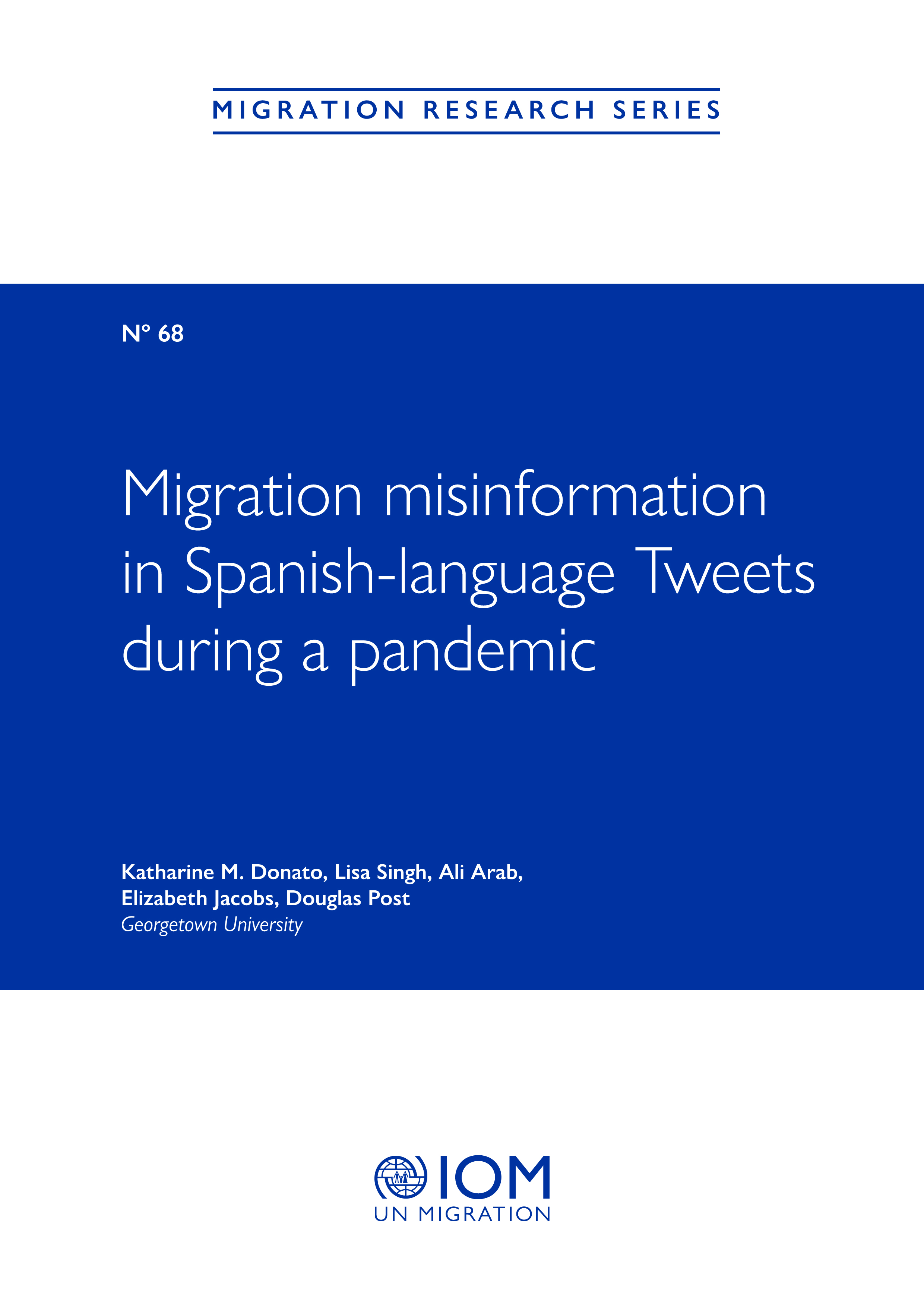
Migration Misinformation in Spanish-language Tweets during a Pandemic
Authored by Katharine M. Donato, Lisa Singh, Ali Arab, Elizabeth Jacobs and Douglas Post, this Migration Research Series paper builds on prior studies of migration misinformation by analysing Twitter conversations in Spanish, the fourth most widespread language in the world. The paper assesses the prevalence of different types of misinformation about migrants and migration in Spanish-language tweets and examines whether and how migration misinformation varies by location and shifts in the spread of this misinformation. Findings reveal that migration misinformation is overwhelmingly about safety threats and, to a lesser extent, about economic and health threats. Migration misinformation is also global: tweets are spatially distributed in specific ways and linked more to traditional news outlets than other sources. Although it resonates more on some days than others, migration misinformation also appears to be fairly consistent across the period of study.
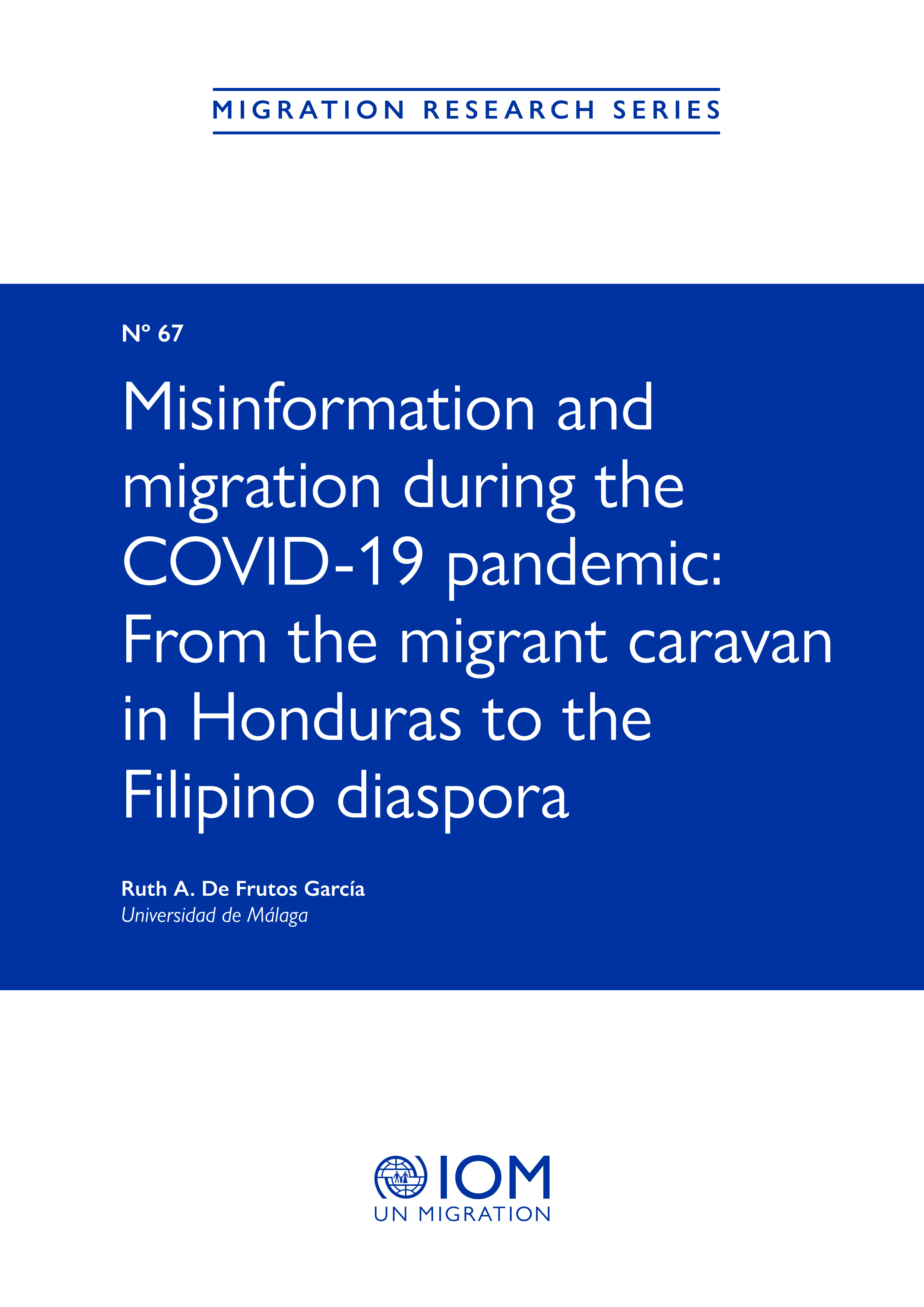
Misinformation and Migration During the COVID-19 Pandemic: From the Migrant Caravan in Honduras to the Filipino Diaspora
Authored by Ruth A. de Frutos García this Migration Research Series paper explores the impacts of the COVID-19 pandemic on misinformation related to migration and migrants through two case studies: that of the migrant caravan in Honduras that took place in 2020 and that of the Filipino diaspora. The paper relies on a social media analysis of different types of misinformation related to these two case studies during the first eight months of the pandemic, from March to December 2020. In this view, the paper critically examines the social media accounts of two media outlets and presents findings from semi-structured interviews carried out with journalists in Honduras and the Philippines.
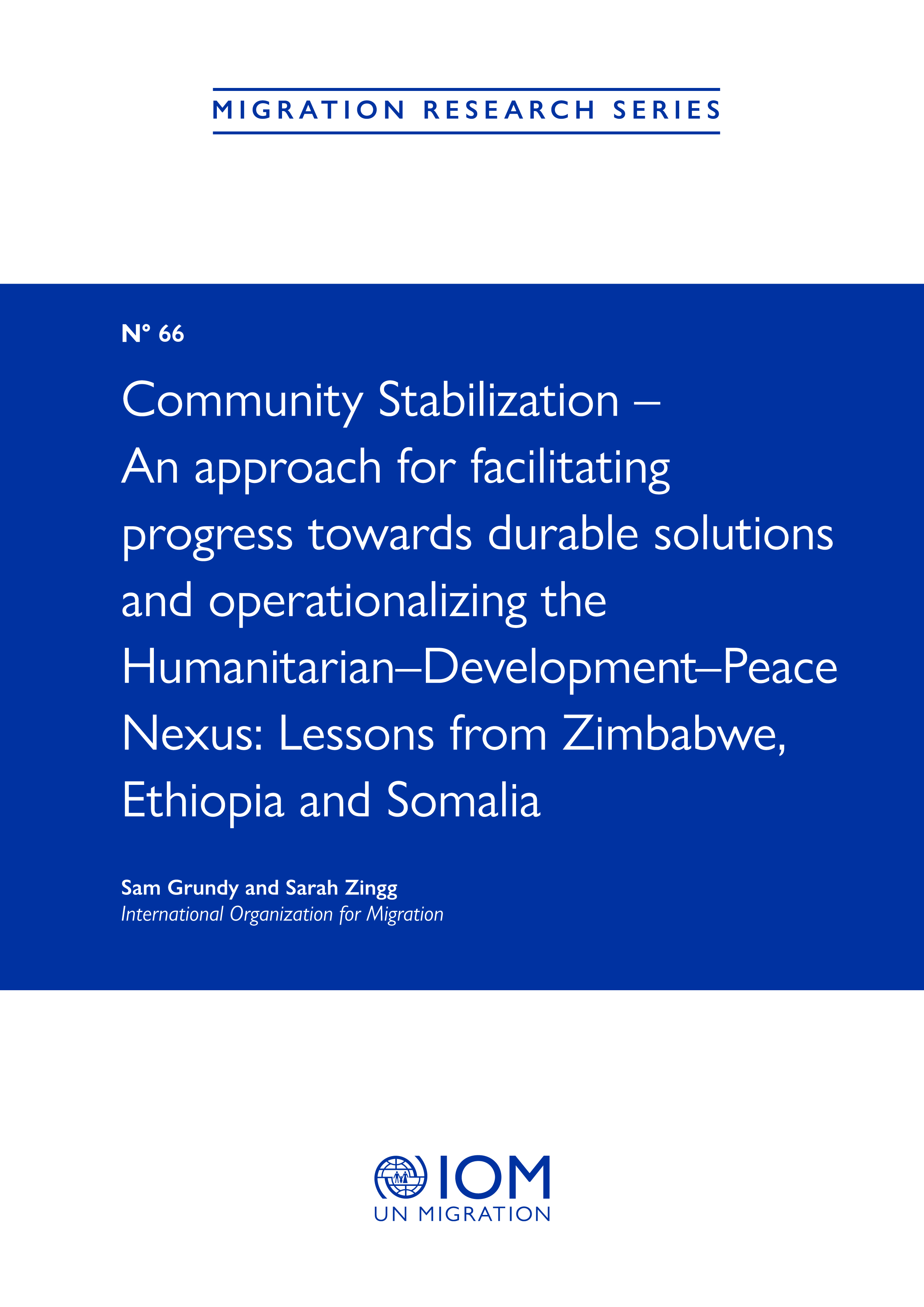
Community Stabilization – An Approach for Facilitating Progress Towards Durable Solutions and Operationalizing the Humanitarian–Development–Peace Nexus: Lessons from Zimbabwe, Ethiopia and Somalia
Authored by Sam Grundy and Sarah Zingg, this Migration Research Series paper discusses the role of the community stabilization approach to transition away from humanitarian crises in order to lay the ground for attaining durable solutions for displaced persons and, ultimately, operationalize the humanitarian–development–peace nexus. The paper focuses on the multidimensional destabilizing impacts of displacement crises and the factors limiting opportunities for communities to transition away from acute vulnerability and aid dependence, and defines the community stabilization approach as a means to overcome these challenges. It then presents the community stabilization core programming principles framed through a community-based planning methodology – a practical community-driven, local government-led process intended to support the transition of impacted communities from displacement crises through improved stability – drawing on examples from Zimbabwe, Somalia and Ethiopia.
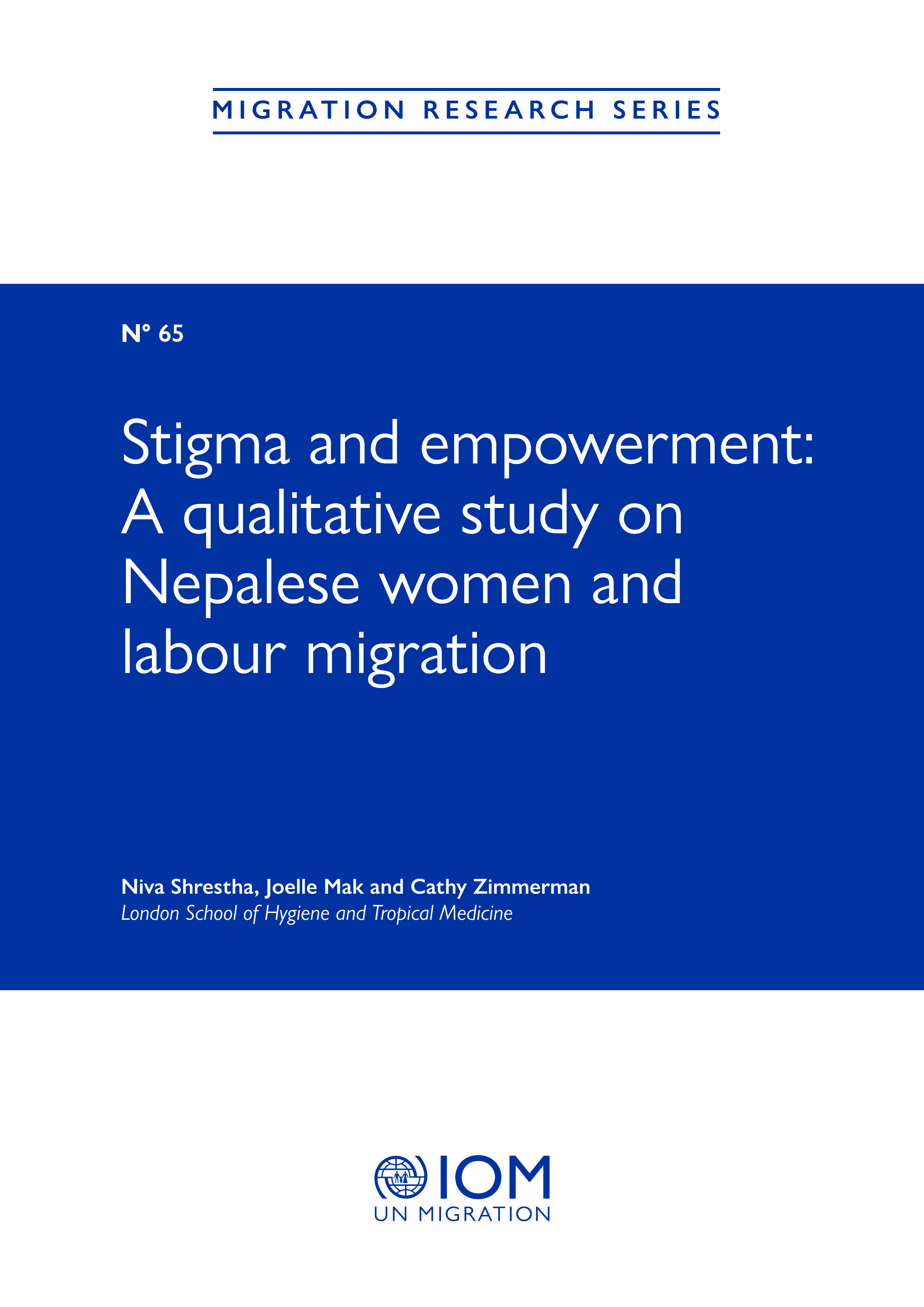
Stigma and Empowerment: A Qualitative Study on Nepalese Women and Labour Migration
Authored by Niva Shrestha, Joelle Mak and Cathy Zimmerman, this Migration Research Series paper explores the concepts of stigma and empowerment through the perceptions and experiences of 55 prospective Nepalese women labour migrants. The results of this qualitative study show that migration can empower women labour migrants gaining access to human and economic resources, by exercising agency through decision-making and, through this, achieving self-worth. But the associated stigma also disempowers them with experiences they face from themselves, their families, communities and the institutions around them. To foster the positive aspects of labour migration of women, interventions are needed to challenge the social and cultural structures that perpetuate gender inequalities and lead to stigmatization of migrant women.
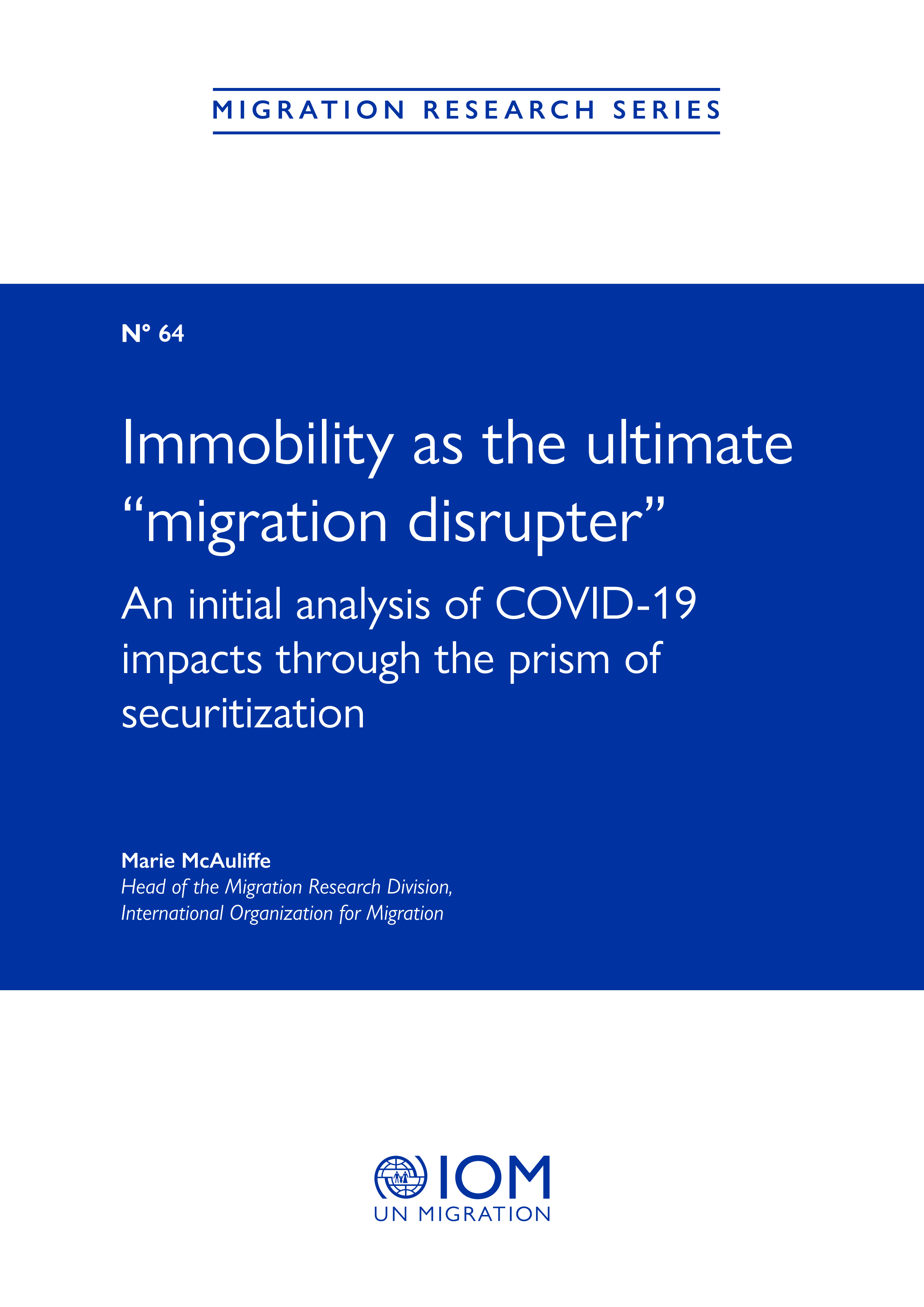
Immobility as the Ultimate “Migration Disrupter”
An Initial Analysis of COVID-19 Impacts Through the Prism of Securitization
In this Migration Research Series paper, Marie McAuliffe examines the widespread and unprecedented imposition of movement restrictions by governments in an attempt to limit COVID-19 transmission and infection, with particular reference to the ongoing securitization of migration. In the current context of growing misinformation, increasing unilateral “strongman” politics, and massive technological change, she offers an initial reflection as to whether extraordinary measures are likely to become ordinary, and the implications for human rights and mobility, before then discussing the need to re-think and de-link migration and mobility with reference to the opportunities and challenges presented by COVID-19.
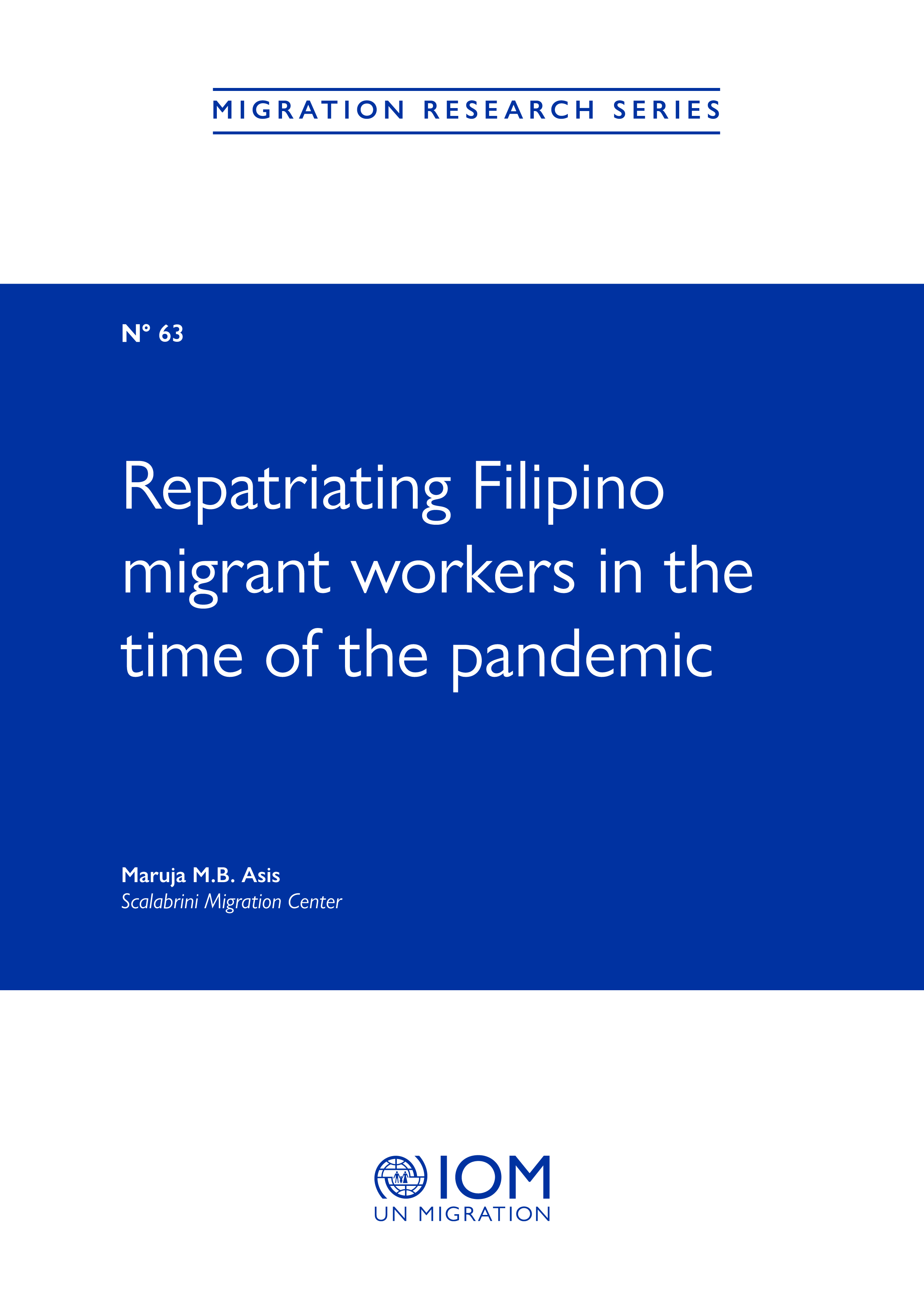
Repatriating Filipino Migrant Workers in the Time of the Pandemic
Authored by Maruja M.B. Asis, this Migration Research Series paper provides an overview of the repatriation of overseas Filipino workers under the COVID-19 pandemic. While noting the Philippines' good practices and guidelines that have helped the Government to respond to crisis situations in the past, the paper explores the unprecedented and enormous challenges so far encountered and highlights emerging good practices for repatriation, including the role of technology.
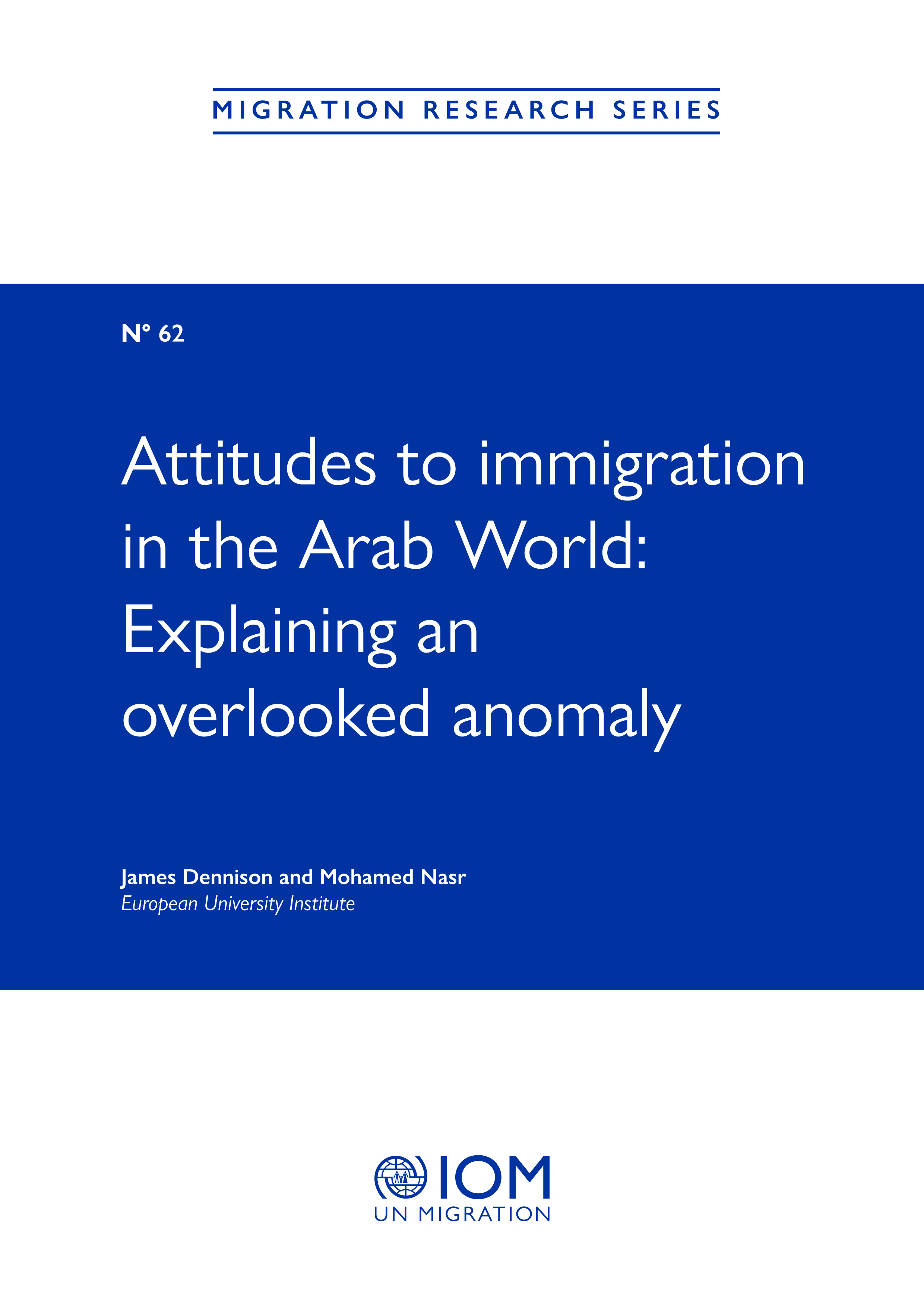
Attitudes to Immigration in the Arab World: Explaining an Overlooked Anomaly
Authored by James Dennison and Mohamed Nasr, this Migration Research Series paper explores public attitudes to immigration in the Arab world and considers their effects on migration policies in the region. Using quantitative data from across the Arabic-speaking world, the paper first examines the relationship between attitudes to immigration and a number of sociodemographic and attitudinal variables. It then analyses the salience – or importance – of immigration as an issue in the region before probing the key determinants of migration policy change, which include public opinion, in four main countries.
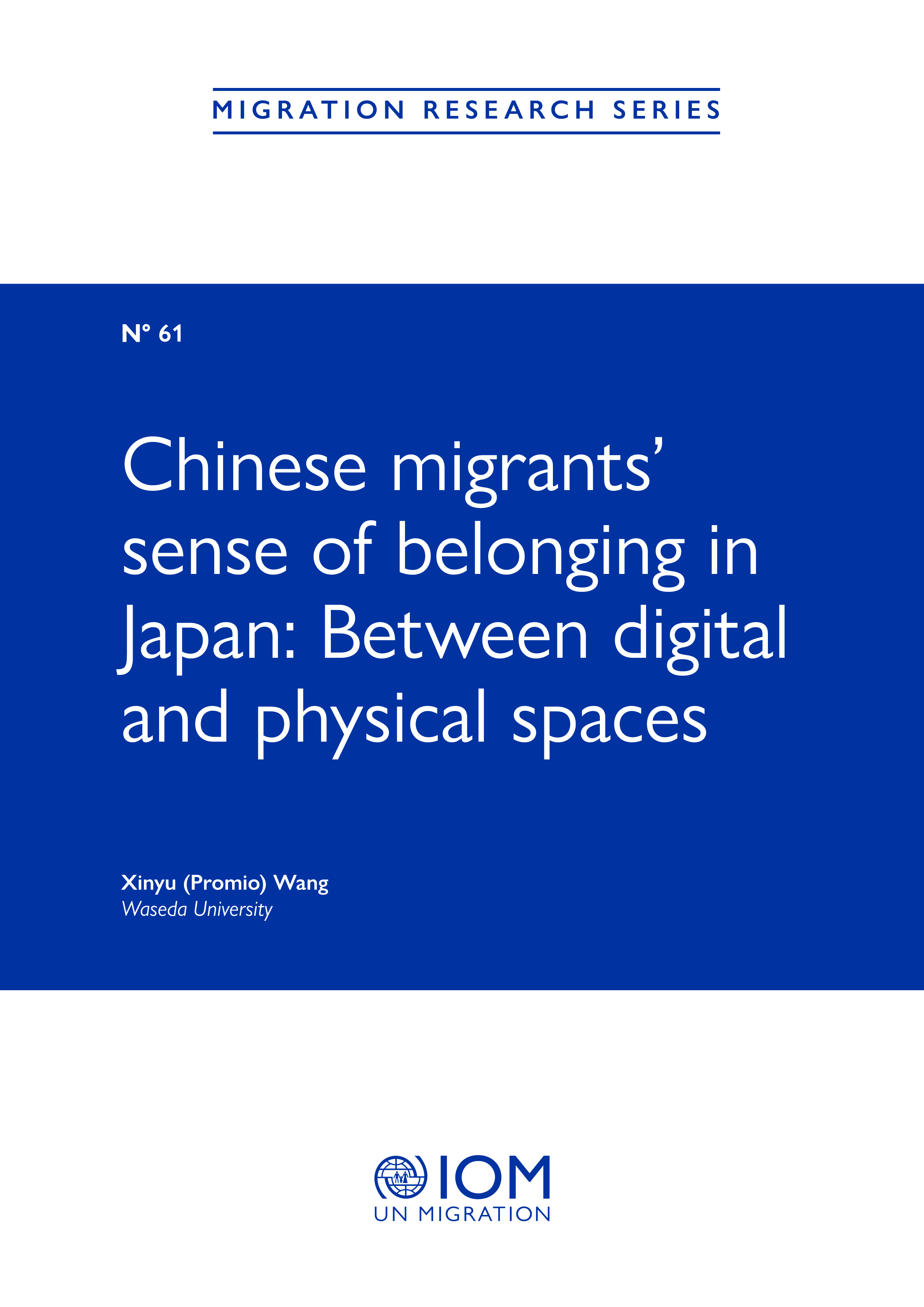
Chinese Migrants' Sense of Belonging in Japan: Between Digital and Physical Spaces
Authored by Xinyu (Promio) Wang, this Migration Research Series paper explores what belonging means and entails for Chinese migrants in Japan in today’s digitalized societies. Drawing on interviews with 55 Chinese migrants in Japan between 2017 and 2019, the paper highlights the impact of digital technologies on fostering a sense of belonging to a transnational imagined community. It also sheds light on how the interactions of the digital and physical spaces have framed a multidimensional sense of belonging for Chinese migrants in Japan.
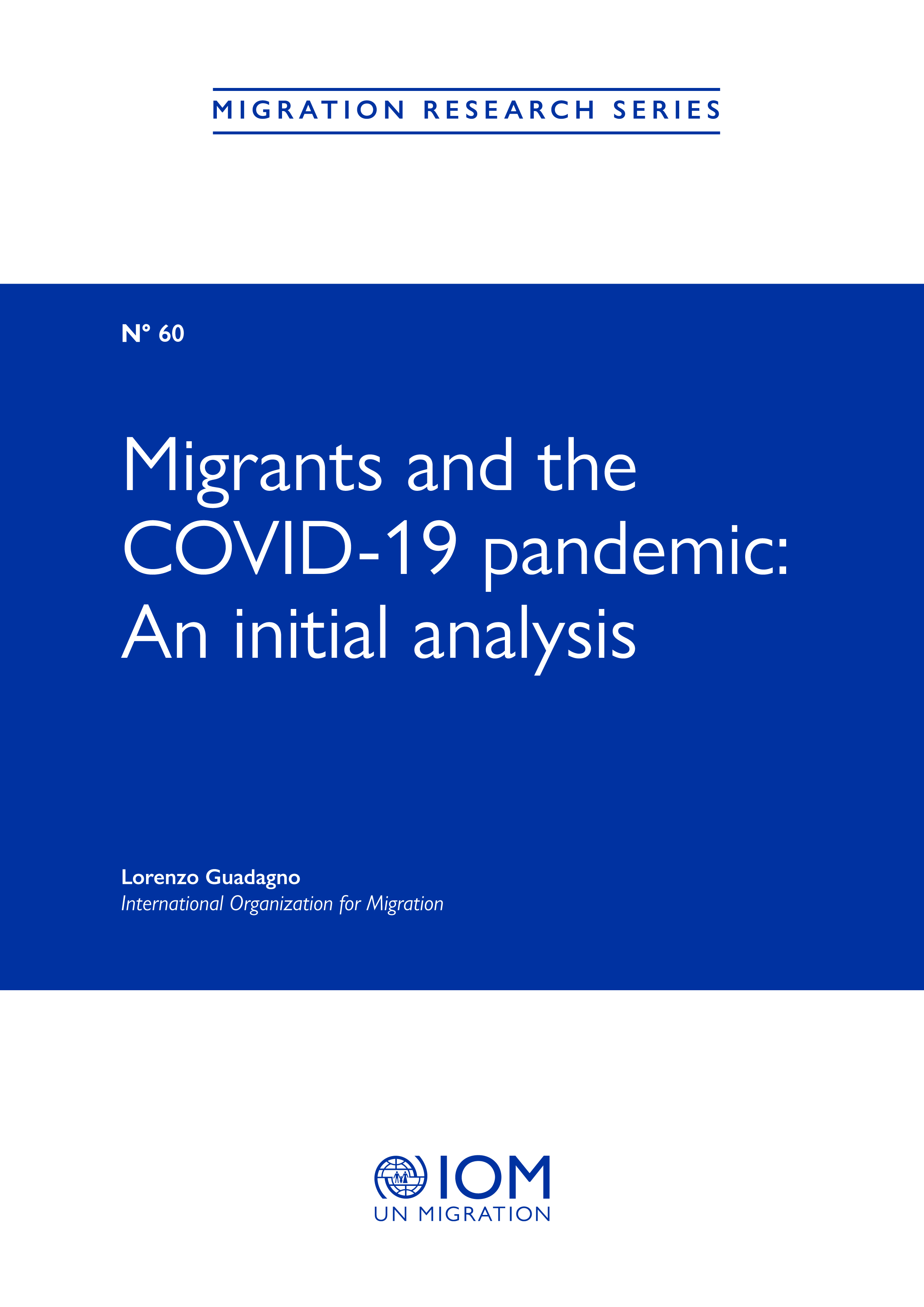
Migrants and the COVID-19 Pandemic: An Initial Analysis
Authored by Lorenzo Guadagno, this Migration Research Series paper offers an initial analysis of the specific ways migrants have been affected by the COVID-19 pandemic. It also presents the diverse measures which have been adopted in receiving and origin countries to prevent, mitigate and address the negative impacts of the pandemic. Its objective is to provide insights for more inclusive and effective COVID-19 responses as the pandemic unfolds to ensure that migrants are duly included.
